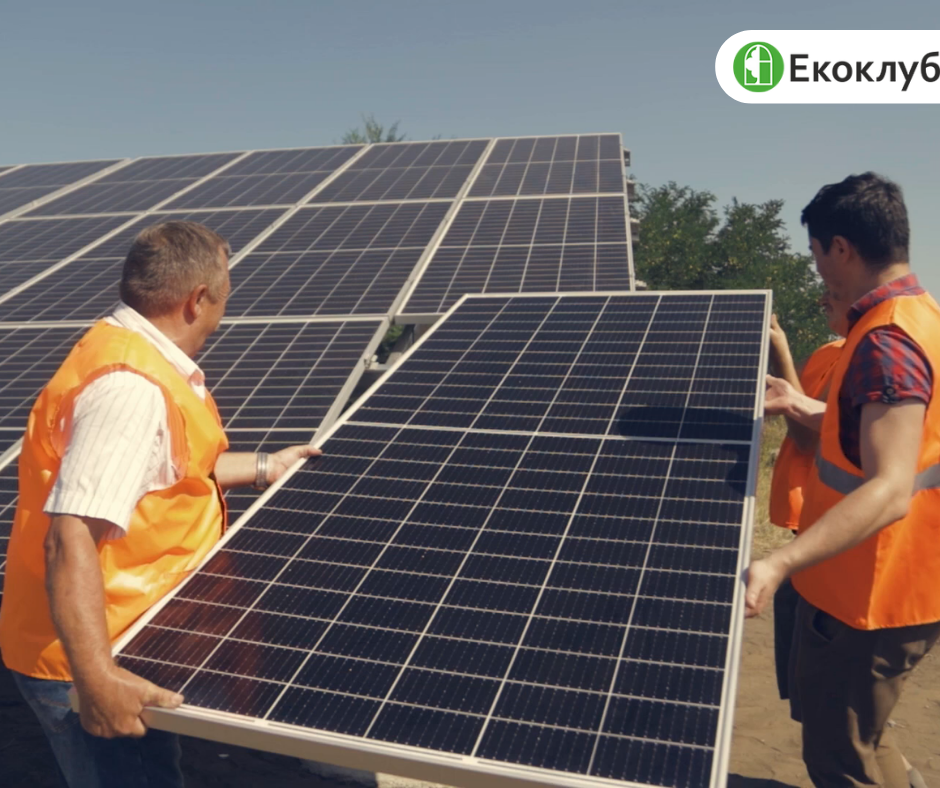Even during the war, Ukrainian municipalities are investing in the development of renewable energy sources. Zviahel (Zhytomyr Oblast) and Brody (Lviv Oblast) have allocated funds from local budgets to install solar power plants (SPPs) to provide water utilities with electricity.
During power outages, the work of water utilities is jeopardized. Without electricity, pumps will not work and consumers would not get any water. The lack of electricity also threatens the operation of wastewater treatment plants, which can lead to contamination of drinking water.
Solar power plants installed for water utilities help reduce the municipality’s electricity costs during normal operations and ensure a minimum supply of water during grid outages.
SPP for Zviahel’s water utility
Since 2021, the Zviahel municipality has been working towards energy independence. Since then, they have introduced an energy management system, started monitoring energy consumption, and implemented a number of energy efficiency projects.
In December last year, thanks to cooperation with Ecoclub, a power plant was installed for a local hospital. Now, the SPP contributes to the provision of medical care regardless of power outages and helps the municipality free up funds for other needs.
On March 14, 2023, members of the city council allocated six million hryvnias from the municipality budget to install an SPP for Zviahelvodokanal. The company provides services to more than 30 thousand municipality residents.
“Thanks to the installed plant, we want to compensate for part of the water utility’s electricity consumption and increase the share of renewable energy in the municipality,” says Yuriy Savych, Head of the Department for Support of Public Initiatives and Energy Efficiency at Zviahel City Council.
According to preliminary estimates, the plant’s operation will help reduce the company’s annual electricity consumption by 164 thousand kWh. This will cover the annual electricity demand by 11%. The projected savings on the electricity tariff will amount to UAH 921 thousand per year (at a tariff of UAH 5.62 per kWh).
Currently, the Zviahel City Council, together with Ecoclub experts, is developing a feasibility study for the installation of an SPP for the water utility, calculating the economic feasibility of the plant.
“The generating capacity of the station was chosen according to the hourly load data so that the maximum generation corresponds to the minimum consumption (except in emergency situations). Thus, all the electricity generated will be consumed at the facility and there is no need to supply electricity to the grid. This simplifies the project both from the technical side and from the side of permits,” says Dmytro Sakaliuk, an expert at NGO “Ecoclub.”
SPP for Brody’s water utility
The Brody municipality has also allocated funds to install a solar power plant for the water utility. For this purpose, 3 600 000 hryvnias was allocated from the local budget. The grid-tied power plant will be installed at three facilities of the Brodyvodokanal utility company. Its total capacity is 100 kW.
Brodyvodokanal provides water supply and sewerage services to 8,254 residents of the municipality. Thanks to the installed solar power plant, consumers will pay a stable tariff for utilities. They will also receive a water supply regardless of power outages.
Electricity production from the SPP is estimated at 106,634 kWh per year. This will cover 13.5% of the company’s annual electricity demand:
“In the event of power grid failures, the SPP will ensure the provision of water supply and sewage services. It will also enable the company to use the saved funds from electricity bills to improve the water utility’s operations,” Brodyvodokanal representatives say.
Why solar power plants for water utilities
Analysis of the seasonal dynamics of water consumption in Ukraine (report of the Institute of Water Problems and Land Reclamation from 2017) shoves, that water utilities usually consume the most water from summer to autumn. During this time, people use water more for their own needs: watering gardens and orchards, and cooking. Also, during this period, water intake for enterprises and other sectors of the economy may increase. Therefore, solar power plants that generate the most electricity during the warm season will allow water utilities to operate at full capacity. They will also provide people and businesses with the necessary volumes of water.
“Russian missile strikes have destroyed infrastructure and left Ukrainians without access to drinking water. Although solar power plants cannot solve all the complex problems associated with war, they can become a vital source of electricity. That is, to provide a minimum supply of water to residents of cities and villages when other energy sources are not available. These sustainable solutions will continue to benefit our communities for the next two decades, promoting development and sustainability,” says Andriy Martyniuk, Executive Director of the Ecoclub.
In Voznesensk City (Mykolaiv Oblast) SPP has been operating at the Voznesensk Water Supply Utility for three years now. Its capacity is 50 kW, which covers 20% of the pumping station’s electricity needs. In November last year, the city council allocated 5 900 000 million hryvnias from the municipality budget to equip an additional 150 kW:
“We are implementing measures that will slow down the growth of tariffs and reduce electricity consumption in the future after the war. Power outages have shown an additional advantage of solar power plants. Pumping stations equipped with solar panels have the ability to provide themselves with electricity autonomously without consuming fossil fuels,” says Victoria Baltser, Secretary of Voznesensk City Council.
The material is published within the framework of the project “Closing the Loop: A Just Energy Transition Designed by Cities and Regions” with the financial support of the European Union. Its contents are the sole responsibility of the NGO Ecoclub and do not necessarily reflect the views of the European Union.











